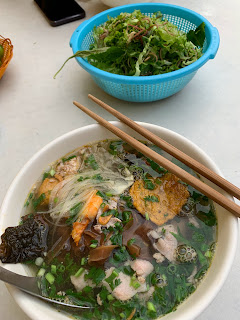It’s my last full day in Vietnam and I thought I would try and touch on an observation. There are very few fast-food outlets here. In the week I have been in Haiphong, which is officially the third largest city in Vietnam, I have seen all of one Pizza Hut, one Starbucks and one KFC. This is strange because in just about every part of the world you go to, you will find the presence of international food chains featuring very prominently.
I am old enough to remember when McDonald’s opened in
places like Moscow, Beijing and New Delhi. They were instant hits in those markets.
In Moscow, it was the celebration of the end of the Cold War. In Beijing and
Delhi, it was the arrival of prosperity. McDonalds and its cousins have not
just conquered the world but played a role in shaping the world as we know it.
Yet, somehow, Vietnam has remained relatively
untouched by international fast food. It’s like an anomaly. Walk along the
streets and you find that every hole on and in the streets has been turned into
a food joint, serving anything from noodles to sandwiches but you will struggle
to find a fast food joint. The inability of international chains to penetrate
the local market has baffled the global business community, which has grown so
used to the power of international brands and their image of “modern (read Western)”
lifestyle conquering all before them. Just look at the following link from
CNBC:
https://www.youtube.com/watch?v=l9pthhpd7So
I am not against multinational fast-food chains. McDonalds
and Burger King breakfast were part of my youth. I have fond memories of hash
browns from both chains and once in a while, I do crave fries. I also love KFC
and do take both the original and spicy flavours.
However, I haven’t been to a fast food joint and spent
my own money in sometime. My eureka moment came during the pandemic when I realized
that my neighbourhood kopitiam economic rice uncle was feeding me something
tastier, healthier and cheaper than the fast-food joints. Yet, despite that, he
wasn’t getting much love from the locals. Call it a case of you can take your
client out to McDonalds but you can’t to the local economic rice.
It's something I’ve realized as a microenterprise. You
can do the job better, faster and cheaper than your multinational competitors
but they’re still going to get the love. I think of the one time I got a chance
to pitch for a quasi-government job. It took someone who was born elsewhere
sitting on the board to push for me to get the chance to pitch. The chairman of
this quasi-government organization started of with “Don’t you see being a
one-man show as a weakness?”
I am not against multinationals per se. I did work for
the likes of GE Commercial Finance and 3M and you when you are in their
proximity, you quickly realise that they are where they are for a reason. From
a national development point of view, they play a vital role in helping a nation
rise by providing capital, know-how and jobs to the local economy. As a matter of
disclosure, I had very comfortable childhood as an “expat” kid in Europe
because my stepfather was a senior person in a multinational advertising
agency.
However, its frustrating when the people in the local
market you are operating in are prejudiced against you because you don’t have a
brand name from London or New York backing you up. To use the food analogy – McDonalds
is where you want to be not the local kopitiam. So, I celebrate being in a place
where people would rather support the street side vendor like this one:
Take speed as an example. Fast food is called fast
because you’re supposed to get it in a matter of minutes. What the fast-food
joints found in Vietnam was the fact that they were not able to deliver a
burger to the customer as the local pho shop you could deliver a bowl of
noodles.
Then there’s an issue of what you see is what you get.
As a matter of disclosure, my dad shot plenty of McDonald’s commercials in his
time. The burgers in pictures look juicy. The burger you get is more often than
not, well not so juicy. The bowl of noodles is less well hyped but what you get
is often exceedingly tasty:
https://www.youtube.com/watch?v=llwyY4BDbfc
The reasons that have held Starbucks back in Vietnam are
similar to the reasons why the burger chains haven’t conquered the market.
Take the central premise of Starbucks – namely the
premise that it provides you with a great place to chill over a cup of coffee.
The local Phuc Long offers exactly the same thing. For the record, Starbucks
was founded in 1971 whilst Phuc Long was founded in 1968, so you can’t claim
that Phuc Long is a cheap Vietnamese rip-off of Starbucks.
In Vietnam, the local chains like Highland Coffee and
Bac Viet Coffee are well suited to deal with local taste. One of my favourite
discoveries has been coffee flavoured with coconut milk.
There is no doubt that multinationals offer great benefits to any given economy. We live in a world where you do need to compete at world standards rather than local standards. However, it doesn’t mean that multinationals are automatically better than their local SME or micro-enterprise competitors. There are things that the small guy can do that stun the big guy. Governments should woo foreign investment but it should never be at the expense of the SME or micro-enterprises. If anything, they should be encouraging micro-enterprises. Would you rather have a population that gets crushed by foreigners or would you rather have a population that knows how to earn a living off the people you bring in?








No comments
Post a Comment